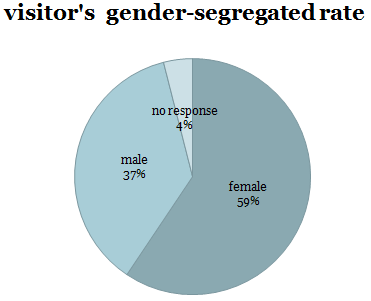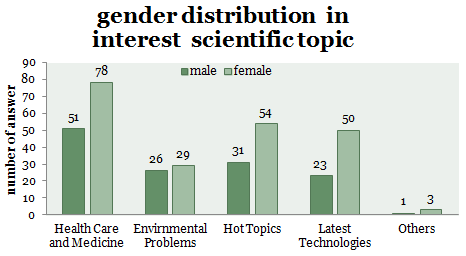Team:HokkaidoU Japan/HumanPractice/Part6
From 2011.igem.org
HokkaidoU Japan
iGEM 2011 Team of Hokkaido University
Contents |
- Top
- Virtual BioArt Gallery
- A society which citizens can think by themselves
- The way to become “citizens who can think by themselves”
- The New Communication Tool, “BIO ART”
- The road to “BIOART"
- What BIO ART was like
- Questionnaire Results
- Review
- To the Future
- Recommended books
- Collaborations
- Acknowledgements
Two days were very short, but we still had an opportunity to spend time with a lot of visitors. Our purpose for this event was to communicate with citizens and have them understand and enjoy science. We also made a questionnaire for citizens to fill out in order to improve our event and to know their current understanding towards science. Below is the contents of the questionnaire. Questionnaire Results
1. The Different Genres of Customers
Dates: September 7, 8, 2011 AM 11:00 ~ PM 8:00
- Visitors: 377 people
- Questionnaires filled out by visitors: 101 papers
- Ratio of the questionnaire filled out: 27%
- Ratio of the visitor divided by genders and generations:
The place we held the “BIO ART” gallery is an underground walking area “Odori” and it is used for going to school/ work due to its closeness of the subway stops. Up to 590,000 people on weekdays and 420,000 people on weekends and holidays use this area. As you can see from the graph above, various generations of people visited us, but men around 30 years old to 50 years old were less. Most likely, they use this area for only going to work.
2. The way information is obtained
How people use science in their daily life? (marked all that apply)
Results
- Science magazine = 13
- Science programs on TV = 36
- Newspapers = 33
- Televised news = 39
- The Internet = 36
- Others...
- Working at a pathology institute = 1
- Teaching science at the elementary school = 1
- From the bulletin board at school/ station = 2
- Nothing = 3
According to the results, people obtain information mainly from using these mediums: TV, newspapers, and the Internet. TV and newspaper have been used for a long time, but the Internet also has come to hold a big role in obtaining information.
3. Latest Interesting Science Topics
What are people most interested in among the latest science topics? (marked all that apply)
Results
- Medical care/ Health - total answers = 126
- iPS cells 34
- Alzheimer 26
- Lifestyle disease 24
- Organ transplant 23
- Environmental Problems - total answers = 58
- Global warming 33
- Destruction of ozone hole 14
- Acid rain 9
- New energy 1 (Others)
- Nature disasters 1 (Others)
- Leading Technologies - total answers = 46
- Smart phones 14
- Gene recombination technology 27
- GFP 5
- Latest science topics total answers 111
- Radiation pollution (::1) 37
- Nuclear power plants (::2) 36
- ”Hayabusa” the movie (::3) 29
- Suzuki Coupling (::4) 5
- BSE (::5) 4
The interests among the people are concentrated to nuclear power plants and radiation pollution that are reported from the media a lot and topics that are related to health which is necessarily in our daily life. And we realized that people answered more to negative topics. Also, when we see it from men's and women's perspective respectively, both genders are interested in medical care and health, but women are more interested in nuclear power plants and they 40% of women answered to this. (Men are about 30%). Also, as to iPS cells, 54% of men, 23% of women answered to this respectively.
- :The earthquake, which occurred on 11th of March at the east side of Japan, caused a huge radiation disaster.
- :After the earthquake, the topic appeared in the media almost every day.
- :This movie will be released in autumn2011 in Japan.
- :Prof. Akira Suzuki, the emeritus professor of Hokkaido University was awarded the Nobel Prize last year.
- :BSE problem was reported by the media.
4. Yes/ No questions about iPS cells
a percentage of correct answers
- Q1. 49.5% (M:54.1%, F:50.0%)
- Q2. 20.8% (M.32.4%, F:15.0%)
- Q3. 43.6% (M:56.8,% F:36.7%)
iPS cells was the third place that people were interested in among the science topics. As you can see from the result, comparative to Q1 and Q3, Q2 has a lower percentage. Probably, citizens have a tendency to see the good aspects of leading technologies from the information they get from the media.
5. Interests towards science communication
Do you want to participate in events about science after visiting our gallery?
Results
- Yes, of course 38%
- Yes, I think so 55%
- Not sure1%
- No, I don't think so 3%
- No, of course not 0%
- No answer 3%
Suggestions and Impressions
About “BIO ART”
- I like science, but it made more interested in science. (Man, 10-19)
- It's a good idea to mix science and art. (Man, 30-39)
- This gallery made me feel closer to science. Thank you. (Woman, 30-39, elementary school science teacher)
- It was so impressive showing photos of cell and it was so clear and it made the children interested in science. (Woman, 30-39)
- I did not understand this gallery's concept. (Woman, 10-19)
- It would be better if you stress the purpose of the exhibit and the information about the iGEM team. (Man, 20 – 29)
Staff and their explanation
- It was informative. The staff's explanation was easy to understand and was very interesting. (Woman, 60-69)
- I think I understand a little from the explanation. (Woman, 60-69)
- They explained me the photo so politely and kindly and it was easy to understand. (Woman, 20-29)
- Photos were so impressive but the staff lacked of experience. I would like to have more information from them. (Woman, 30-39)
About the contents
- Photos were so beautiful that if there was a book of them, I'd like to buy it. (Man, 10-19)
- It was very beautiful (Man, 30-39 / Woman, 20-29)
- The exhibits were so mysterious. I don't have an opportunity to experience looking at cells so I'm glad to see these very interesting exhibits. (Woman, 20-29)
- I was stopped by these beautiful photos. (Woman, 60-69)
- It would be better if there were more art by the students, not only by professors. (Man, 30-39)
- It's interesting even though I don't know what's going on there. (Woman, 60-69)
 "
"














